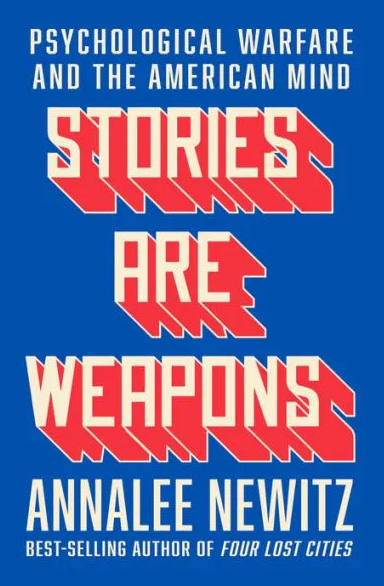Stories Are Weapons: Psychological Warfare and the American Mind
- By Annalee Newitz
- W.W. Norton & Company
- 272 pp.
- Reviewed by Teddy Duncan Jr.
- June 12, 2024
A smart, if biased, look at psyops in the U.S.

War brings nearly indiscriminate death and destruction, rendering the enemy an object “justifiably” deserving of slaughter. Yet even war has limits placed on it by international law; it requires the drawing of distinctions between soldier and civilian, between those targets considered fair game and those deemed innocent bystanders. When these boundaries are violated, war is said to be a crime.
Such emphasis on war’s physical manifestations, however, leaves out the many other kinds of harm that can be done during battle. In Stories Are Weapons, journalist and science-fiction writer Annalee Newitz seeks to expose a deep, especially pernicious form of warfare not reliant on bombs or bound by the Geneva Conventions: the psychological war waged on Americans by Americans.
Written in accessible, documentarian prose and providing deft analysis, Stories Are Weapons delineates the history of propaganda in the United States. Though psychological warfare has long been deployed against foreign enemies, Newitz analyzes its domestic use via a seamless blending of disparate subjects ranging from comic books, the Trail of Tears, and eugenics to contemporary LGBTQ+ issues, Cold War propaganda, and more.
Newitz’s book is predicated on the notion that propaganda, psyops, and psychological warfare are all forms of narrativization — stories told with the intention to modify mass perspective. They (Newitz uses they/them pronouns) even establish psyops as a fundamentally American tradition, referring to the use of media to help remove Indigenous people from the land, thereby clearing it for white colonization.
Stories Are Weapons can be read through the prism of one important book: Paul M.A. Linebarger’s Psychological Warfare, which was the first formalized psyops handbook and is, as Newitz calls it, the “bible of psywar.” Notably, Linebarger, who helped establish psyops as an official practice, was also a sci-fi writer and recognized that psychological warfare and propaganda are simply different ways of storytelling.
Yet Newitz doesn’t focus on the military function of psyops. Instead, they detail the way psyops have penetrated civilian life in the form of culture-war propaganda. They assert that coordinated influence campaigns — such as Cambridge Analytica’s extraction of private data from Facebook to induce certain demographics, via targeted “false” advertisements, to vote for Donald Trump — are indicative of today’s insidious domestic psyops.
The book meanders through issues such as voting, eugenics, and anti-LGBTQ+ propaganda. Newitz offers an astute critique of Charles Murray’s The Bell Curve, convincingly demonstrating that it represents an iteration of propaganda that relies on an artifice of rationality. According to Newitz, this is a “weaponized rhetorical strategy” that they later call “false rationality, making [Murray and his co-author’s] opinions look like facts.”
Newitz classifies anti-LGBTQ+ sentiment as a psyop, one that spread from the “Lavender Scare” of the McCarthy era to contemporary school systems. They contend that the current obsession with Gay-Straight Alliances and LGBTQ+ topics in schools is the result of a well-coordinated effort carried out under the guise of “parental rights.”
Later, the book discusses counter-psyops dispatched through fictional narratives. Newitz explicates how “Wonder Woman” was an effective psyop against a patriarchal culture that also highlighted applied science fiction — using fiction to imagine new realities that contest the prevailing ideological landscape. They even go so far as to claim that fiction can “drown out” racist messages by envisioning a non-racist future.
While Stories Are Weapons is certainly well researched — and features surprising interviews with, among others, author Ishmael Reed and military operatives, as well as cross-disciplinary namedrops from Freud to Habermas — there remain substantial oversights. Namely, the text is baldly partisan: Rather than a history of psyops in America, this is a history of conservative psyops in America.
This reductive analysis causes the author to employ an overdetermined definition of propaganda that comes to encompass any dishonest message fed to the masses. By that standard, what’s the difference between, say, an Arby’s commercial and the things Newitz refers to as psyops? Between half-true Democratic messaging on subjects such as drone warfare and Donald Trump’s ostensible collusion with Russia? Or even between the 1994 crime bill and current culture-war psyops that Newitz identifies and (rightly) condemns? Nothing aside from the author’s hyper-partisan selectivity can explain these arbitrary distinctions.
What Newitz has done throughout the book is sneak an implicit value-judgment into her definition of propaganda: Psyops are what the bad conservatives do, and counter psyops are what the good liberals do. In truth, it is the powerful of all political stripes who propagate what Newitz calls psyops, oftentimes steeped in lies, in order to influence public opinion and action. The problem here isn’t that Newitz is wrong in their assessment of America’s past treatment of Indigenous people or the abhorrence of hyper-conservative positions vis-à-vis LGBTQ+ and race issues. It’s that their analysis is itself functionally propagandistic.
Teddy Duncan Jr.’s freelance writing has appeared in publications such as Merion West, Emerald Magazine, Creative Loafing (Tampa), and Document Journal; his fiction is in Hobart Pulp, Forever Magazine, X-Ray Magazine, Five-2-One, and Expat; and his scholarly work is in Latin American Literary Review, the International Review of Zizek Studies, the Midwest Quarterly, and Between the Species. He can be reached at [email protected].

